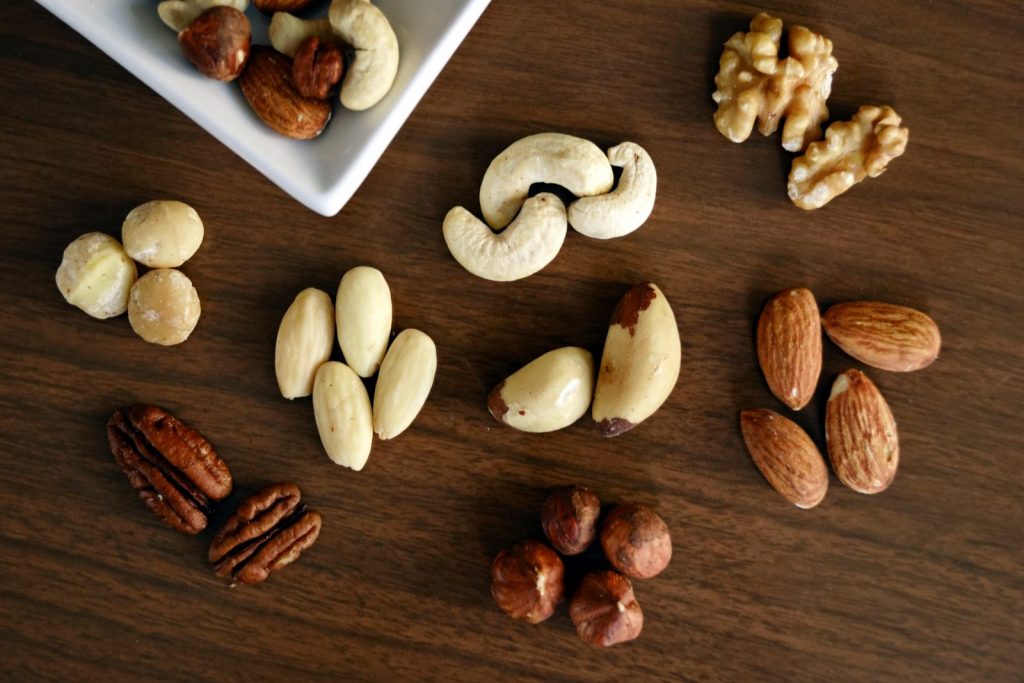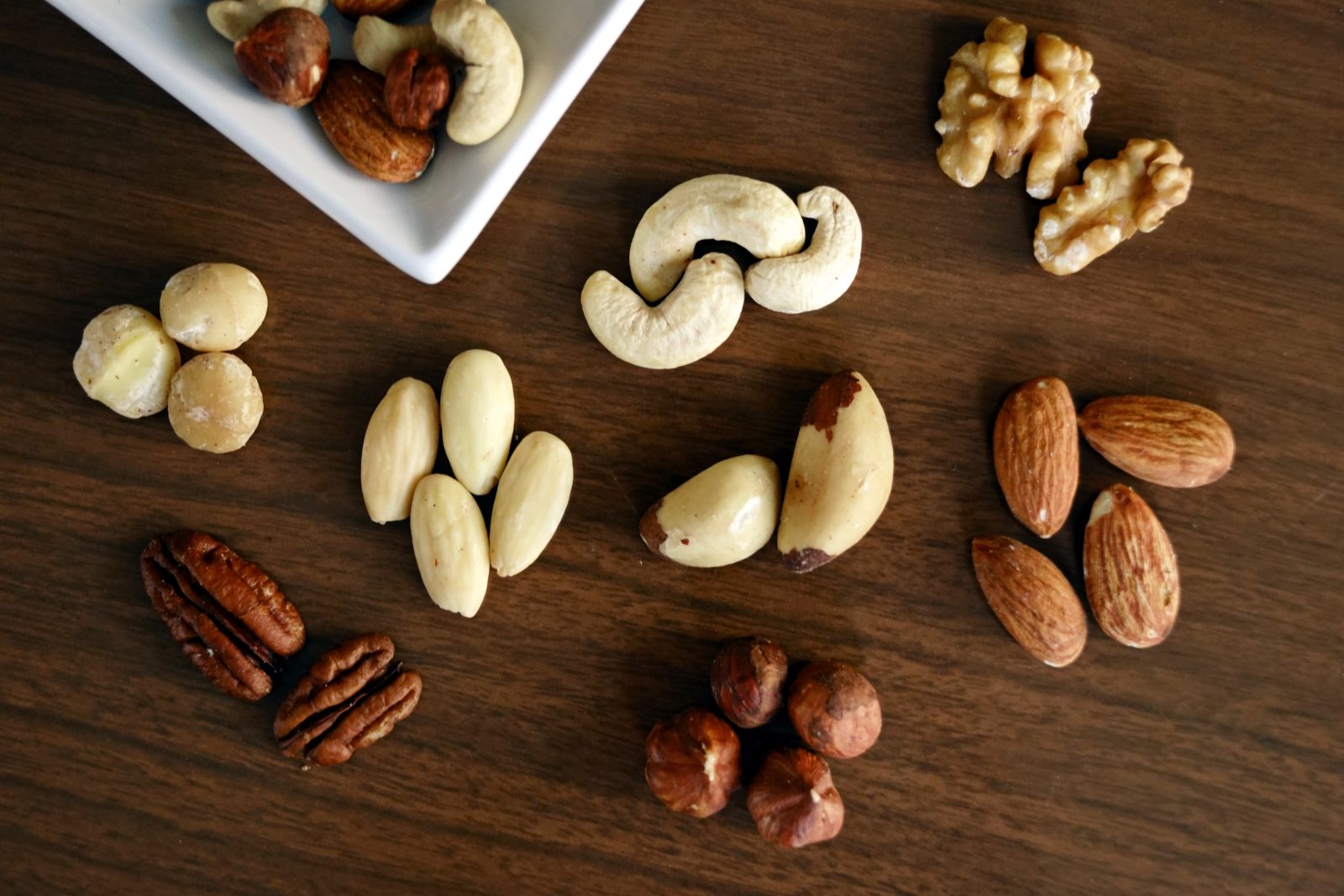
What is white almond butter and how is it different to brown almond butter?
Brown almond butter is made with skin-on almonds and white almond butter is made from toasted blanched almonds.
Most almond butter found in supermarkets has dark brown flecks – which are little pieces of the almond skin. Generally, the skin of fruit and veg is extra nutritious, with the highest density of nutrients sitting just under the skin (so it’s best to scrub your carrots, not peel them!)
Almonds, however, are different. The skin contains anti-nutrients (i.e. not good for you) called ‘phytates’, which are a natural way the plant stores phosphorous (contained in fertilizer). In the human digestive system, phytates bind crucial nutrients like iron, zinc calcium, magnesium and manganese and prevent us absorbing them (i.e. lowers ‘bioavailability’).
Choosing white almond butter avoids this – leaving all the lovely fibre, nutrients and good fats ready to nourish our bodies!
White almond butter also has a smoother texture and creamier, slightly sweet flavour. Almonds contain 4% naturally occuring sugars, and once the skin has been removed, this sweetness shines through.
Why is white almond butter easier to digest than brown almond butter?
The skin of almonds is made of tough, indigestible fibre, and this can make it abrasive in a sensitive gut. Certain types of gut microbes can ferment this type of fibre and produce gas – which will show itself as bloating, cramping, general abdominal pain and flatulence. Not good…
Some people can tolerate insoluble fibre, but others – like me – can’t. For us, white almond butter made from skinless almonds is, well, better!
And the smooth, creamy white almond butter made from toasted, skinless almonds tastes better, too.
Is almond butter healthier than peanut butter?
Overall, yes as it contains more vitamins, minerals and fibre and is less likely to contain aflatoxin than other nuts, but peanut butter contains slightly more protein.
How is almond butter good for you?
Almond butter has many health benefits; it is high in fibre and protein, and contains numerous vitamins and minerals. 1oz/30g almonds contains:
- Fibre: 3.5 grams
- Protein: 6 grams
- Fat: 14 grams (9 of which are monounsaturated)
- Vitamin E: 37% of the RDI
- Manganese: 32% of the RDI
- Magnesium: 20% of the RDI
- copper (26% RDI), vitamin B2 (riboflavin) (18%) RDI and phosphorus (15% RDI).
Low in sugar and high in fibre, almond butter can also help with weight loss (they help you to feel satiated and do not increase blood sugar) and can help to reduce your risk of diabetes and cardiovascular disease.
Is almond butter good for weight loss?
Willpower is a finite resource and so any diet or eating plan that requires willpower to stick to will likely be doomed to failure. So what to do? The key is to ensure you feel satiated.
If you feel full and satiated, you are much less likely to overeat or snack and are much more likely to be able to resist the doughnut or slice of chocolate cake…
When you eat a meal, the gut sends signals to the brain about what you have eaten, and when it thinks you’ve had enough, it will make you feel full and satiated. Three food groups send ‘satiation messages’ to the brain: protein, fat and fibre. And almond butter has all three. So, in this way, almond butter – and all nut butters – can help with weight loss, particularly if added to oatmeal or fruit/veg smoothies. But, as with many foods, it’s best not to go crazy – or it could have the opposite effect!
Are LOVENUTTY nut butters low FODMAP?
The short answer is yes, they are. Our low-sugar range is specifically designed for people (like me) with IBS and other gut issues such as SIBO – in fact, these nut butters were developed specifically with SIBO in mind.
We use erythritol and stevia as sweeteners because these have the lowest effect on people with gut issues and are less likely to cause bloating than other sweeteners.
Of our ‘Sweet Treat’ range, most are only 10% sugar or less ( the exception being ‘Jewelled’ almond butter, which is higher in sugar, so probably not suitable for people with severe IBS and other gut issues).
Why is almond butter more expensive than peanut butter?
Around 80% of the world’s almond are grown in California. This is a big state and has a lot of different climates in different regions, but it’s fair to say that overall, California is in a drought and has been for several years.
It is true that almonds are quite ‘thirsty’ crops (it takes around a gallon of water per almond).
But, compare this with avocados (220 gallons per avo) or a pack of butter (two sticks) – 1000 gallons, and farmed meat? Let’s not even go there…
By choosing a plant-based diet (or even just increasing plants and reducing meat in your diet) you are already helping to conserve water. And almond butter? Maybe just don’t go ‘nuts’ with it!
What are erythritol and stevia and why do you use them in your nut butters?
Erythritol is a plant-based sweetener that has zero calories and it’s my favourite sweetener! Why? As it passes through your digestive system, 80% is absorbed into your bloodstream (without affecting blood sugar! Hurray!) and is excreted unchanged by the body; with xylitol, by contrast, all of it stays in the gut, is fermented by gut microbes, hence the diarrhoea and bloating this sweetener causes.
Only 20% of erythritol is left in the gut, and this means very few problems for people with SIBO or IBS. Find out more here.
Stevia or more accurately, steviol glycosides, are plant extracts of the Stevia plant that grows in to Paraguay and other tropical areas of the Americas. The extreme sweetness of the leaves has been known locally for centuries but has recently been cultivated and manufactured commercially on a large enough scale to be sold in supermarkets. It has a bit of an aftertaste, which some people seem to taste more strongly than others. We only use a very small amount of stevia in our recipes, so the aftertaste is minimal.
As the negatives of the traditional sweeteners (aspartame, Ace-K, saccharin) have been revealed, I think erythritol and stevia together are the most gut friendly and least problematic of the sweeteners currently available. We only use erythritol and stevia in our low sugar spreads.


